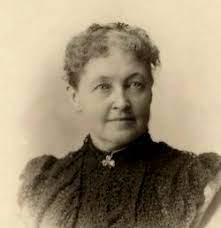
As usual with women in history, what happens is that you catch glimpses of activity and add those glimpses together.
To recap part 1, Annie’s parents were devoted to learning, but her father died when she was 2, her mother supported the family as a tailor in a cottage on the western edge of what was then still a small town—an area of wooden buildings and financially struggling people. Annie met Charles—older, a graduate of Dartmouth and Harvard Law--probably at the Presbyterian Church, and entered the life of prosperous middle class in far exurbia in Hyde Park township. Her house was very large, so she brought her mother to live with them in her own rooms--which she furnished with the library of books and mahogany furniture she'd brought in 1837 on the Erie Canal.
Charles and Annie were devoted to each other to a striking degree. They didn’t have children, which I think was probably a great sadness because their friends noted how much they reached out to neighborhood children. Charles was beloved by his friends and esteemed by his legal colleagues. They were Lincoln supporters in the large circle of Lincoln supporters in Chicago. They helped build the First Presbyterian Church of Hyde Park started by Paul Cornell, which was a stop on the Underground Railroad.
In the 1860s, when the Illinois Constitutional Convention was accused of corruption, a reform coalition managed to elect Charles as the president of the convention to clean things up. Annie and Charles moved down to Springfield for two years. Charles was not one of the movers and shakers that were starting to make huge fortunes in the rapidly growing city, but when they moved back, he did dabble in some real estate on the edge of the city. He was doing well enough, of course. They built a large library wing onto their already large house. Charles loved literature, but I suspect it was Annie who thirsted for knowledge. Annie recalled that it was in their library that the South Parks Commission met to spread out all the plans for what would become Jackson Park, Washington Park, and the Midway.
Settled in, Annie entered into the growing social life of the neighborhood and the city. A glimpse of how central she was to that life showed up around 1866, when General Ulysses S. Grant was the guest at the home of Norman Judd. Annie was the one who stood next in the receiving line because she was the one who knew everyone’s name, occupation, and residence in the city.
And then the Great Fire of 1871 destroyed the city to their north—sweeping away the west side neighborhood where she’d grown up, the buildings on Charles’ real estate investments, and the fortunes of many of their friends. The death toll was remarkably low for the scale of destruction, but the numbers of people without shelter, clothes, or food were enormous.
Annie quickly saw that the official aid agency had rules that meant that many from her old neighborhood weren’t qualifying for help. So Annie decided to launch her own relief effort without strings. She enlisted her friend Mrs. Medill, wife of the man who was publisher of the Tribune and just happened to be mayor, to help her reach those "beyond the Aid Society's rules." The Medill house was still standing near where many of the needy were stranded. She wrote to everyone she knew outside Chicago—especially Charles’ friends from his college days at Dartmouth and Harvard—to get them to send donations direct to that address. Her efforts were important enough that the memory of them survived for another 50 years.
Annie was organizing this on her own because Charles was traveling in the fight to get aid for the devastated city. He was one of three Chicagoans sent to Washington, D. C., to convince them of the then unusual act of providing aid.
Given the next phase of her life, I find it interesting that there’s another Annie story about the fire. Susan O’Connor Davis tells a story that Annie went to the burnt out opera house and rescued the set of allegorical statues that had been part of the façade from the rubble and set them up in the grounds, a memory that music would be back. Annie thirsted for culture and she believed that others, not just the rich, did too.
No comments:
Post a Comment